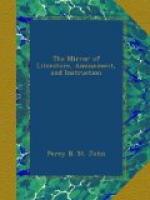We must pass over Peter Kipperson, an excellent whole-length portrait of a man who makes a noise in these marching times, and show in Sir George Aimwell, of Neverden Hall, Bart., who was descended from a long line of illustrious ancestry, and was a wholesale poulterer, and one of the great unpaid. Not that we mean by this expression to insinuate that the retail poulterers did not pay him for what they had: we merely mean to say, that the preserve-worshiping, springgun-setting, poacher-committing baronet administered justice for nothing; and with reverence be it spoken, that was quite as much as it was worth. The worthy baronet was a most active magistrate, peculiarly acute in matters of summary conviction; and thinking it a great pity that any rogue should escape, or that any accused, but honest man, should lose an opportunity of clearing his character by means of a jury of his fellow-countrymen, he never failed to commit all that were brought before him.
Sir George professed Whig politics; these were hereditary in his family, but by no means constitutional in him as an individual. Therefore he passed for a very moderate Whig; for one who would not clog the wheels of government. In short, he was no more a Whig than a game preserver ought to be; and that, as our readers know, is not much. He took especial pains to keep the parish clear of vagrants and paupers; and by his great activity he kept down the poor-rates to a moderate sum. Sir George, though a professed Whig, was not very partial to the education of the lower orders, and he always expressed himself well pleased when he met with a country booby who could neither read nor write. For this reason Nick Muggins, the postboy, was a great favourite with him. Our worthy baronet could not see the use of reading, and he thought it a great piece of affectation for country gentlemen to have libraries. His own books, for he had a few, were huddled together in a light closet, where he kept his guns and sporting tackle. There was a Lady Aimwell, wife to Sir George; but this lady was a piece of still life, of whom the neighbours knew nothing, and for whom her husband cared nothing.
Everybody in the neighbourhood remembers the impressive admonition which Sir George gave to an old man who was convicted at the quarter sessions of having a bit of string in his pocket, and therefore strongly suspected of a design of a malicious nature against the game.
“John Carter,” said the worthy baronet, “let me address to you a few words on the sin of poaching. Poaching, John Carter—is—is a sin of which too many are guilty, owing to the lenity of our most excellent laws. I think that if everybody thought, as I think, of the moral heinousness of this offence, nobody would be guilty of it. Poaching is not yet made felony; but there is no saying how soon it may be made so, if the crime be persisted in. It is a moral offence of the greatest enormity, and is one of those crying, national sins, which may one day or other bring down the vengeance of heaven on our guilty country. Now, John Carter, if you go to gaol for six months, I hope the tread-mill and the chaplain will work a thorough reformation in your morals.”




